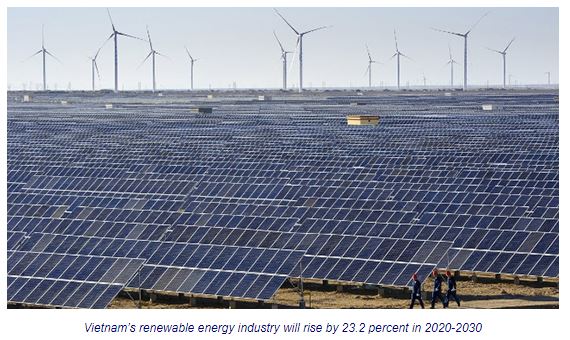Foreign investors enter Vietnam’s renewable energy industry through M&A
The Hanoitimes – Preferential policies in the renewable energy industry have helped Vietnam lure more foreign investors to enter the industry rapidly through mergers and acquisitions (M&As) with local peers.
Thailand’s B Grimm Power Plc has recently announced the completion of a US$35.2 million acquisition of a solar photovoltaic power projects in Vietnam. Specifically, BGRIM, through subsidiary B Grimm Renewable Power 2 Ltd, has acquired an 80 percent stake in Phu Yen TTP Joint Stock Company, the project company investing and developing in a 257MW PV scheme in Phu Yen province on the south central coast of Vietnam.
According to BGRIM President Preeyanart Soontornwata, Phu Yen will particularly contribute to BGRIM’s growing renewal power portfolio as well as strengthening its presence in Vietnam.
BGRIM has recently also completed a deal for a 55 percent stake in the 420MW solar powerhouse in Tay Ninh, southwest Vietnam, billed as the largest of its kind in Southeast Asia.
Another Thai firm Sermsamg International Co., Ltd. has also acquired an 80 percent stake in the Binh Nguyen solar power project in the central province of Quang Ngai at a cost of US$17.6 million.
Earlier, IFC, a member of the World Bank Group, and Armstrong S.E. Clean Energy Fund (Armstrong) also decided to take part in Vietnam’s renewable energy sector by investing in Gia Lai Electricity Joint Stock Company (GEC), a dedicated renewable energy private equity fund based in Singapore.
IFC and Armstrong will take 16 and 20 percent equity stakes in GEC, respectively, and for both investors the partnership with GEC will be their first investment in Vietnam’s power sector.
Various incentives in place
According to experts, a series of preferential policies on price, credit, import tax, export tax and corporate income tax have encouraged both foreign and domestic investors to pour in the renewable energy industry, which is expected to grow by 23.2 percent between 2020 and 2030.
The government has far applied attractive prices for renewable energy. The feed-in tariff (FIT) for solar power is set at 9.35 cents per kWh while the rates for wind power of onshore and offshore projects are 8.5 US cents and 9.8 US cents per kWh, respectively.
Besides, tax exemption is extended to goods imported as fixed assets for solar power projects. Goods imported to carry out solar power projects that are not available on the domestic market are also exempted from import duties.
Solar power projects also enjoy corporate income tax exemption and reduction as the same as those granted to projects eligible for investment incentives.
In addition, for grid-connected solar power projects, transmission lines and substations are also exempted from land levy, land rent and water surface rent.
According to experts, the participation of foreign investors in the country’s renewable energy industry will help it develop effectively and rapidly.
Vu Thi My Dung, an expert at financial and economic information service provider StoxPlus, said that a domestic-foreign joint cooperation model should be promoted.
While domestic firms lack sufficient technology, experience and financial capacity, international partners can complement this, Dung said, adding that for the best management, foreign firms can choose to increase their investment in each phase of the project until they hold 100 percent of the joint venture capital.
As of now, Vietnam has a total of 245 renewable energy projects which have been deployed in different stages. If all projects are actually carried out, the amount of clean electricity generated should reach 23.2GW, which is more than 10 times the target set for total renewable electricity capacity by 2020 as per the National Power Plan VII.
Source: http://www.hanoitimes.vn/investment/news/2018/09/81E0CCA9/foreign-investors-enter-vietnam-s-renewable-energy-industry-through-m-a/


 Thailand
Thailand




